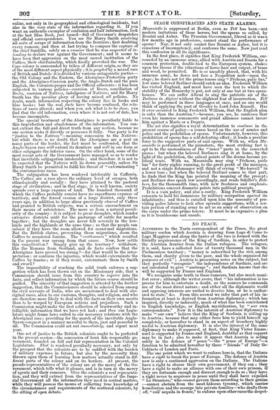STAGE CONSPIRACIES AND STATE ALARMS.
lfasaniello is suppressed at Berlin, even as Tell has been—not modern imitations- of those heroes, but the operas so called, by Rossini and Auber. The Prussian Government, liberal as it was a few months ago in professions, cannot stand the performance of operas ! Nay, it not only cannot face Rossini or Auber, but it is conscious of incompetency, and confesses the same. Now just read this confession in all its significance.
In the first place, it signifies that King Frederick William, sur- rounded by an immense army, allied with Austria and Russia for a common protection, double-tied to the European system, shakes upon his throne if the vibrations of horse-hair and catgut, of brass and wood, be permitted. He is so unsafely placed, that, with his immense army, he dares not face a Neapolitan mob—upon the stage; he dares not let the primo tenore sing " Pecheur, parle bas," lest some beloved Berliner should catch an idea. Frederick William has visited England, and must have seen the test to which the stability of the Monarchy is put, not only at one but at two opera- houses. We can suffer Alboni to sing the patriotic air of the Italian in Algieri without the slightest fear of insurrection. Tell may be performed in three languages at once, and no one would think of applying the part of Gessler to Lord John Russell. Has it ever occurred to King Frederick William, that the English plan is safer than the Austrian ?—because, you see, he confesses that even his immense armaments and grand alliances cannot insure him against a Mario or a Duprez.
The act also signifies a royal determination to continue in the present course of policy—a course based on the use of armies and police and the prohibition of operas. Unfortunately, however, this prohibition of operas has a self-defeating effect; it lends a peculiar force to the suggestive parts of said operas. With us, when Ma- saniello is performed at the pianoforte, the most striking fact is apt to be the unsteadiness of the " inner" parts in the concerted pieces : but when the beloved Berliners sing it at home, by the light of the prohibition, the salient points of the drama become po- litical texts. With us, Masaniello may sing " Pecheur, parle bas" for forty nights running, to the great profit of the manager, and not a single fishmonger will think of crying " Me-karrell" in a lower tone ; but when the beloved Berliner comes to that part, he finds that the King has pointed the meaning of the precept ; and Berliner does speak low accordingly, and reads Schiller's Rob- bers, for the thousandth time, with new freshness and emphasis. Prohibitions convert dramatic points into political precepts.
It is a vain policy, and also a costly. King Frederick William consents to hold his dominions by military occupation against its inhabitants ; and thus is entailed upon him the necessity of pro- viding police labour to look after operatic suggestions, with a cer- tain portion of standing army to act as an army of observation on the corps under the primo tenore. It must be as expensive a plan as it is troublesome and unsafe.


























 Previous page
Previous page